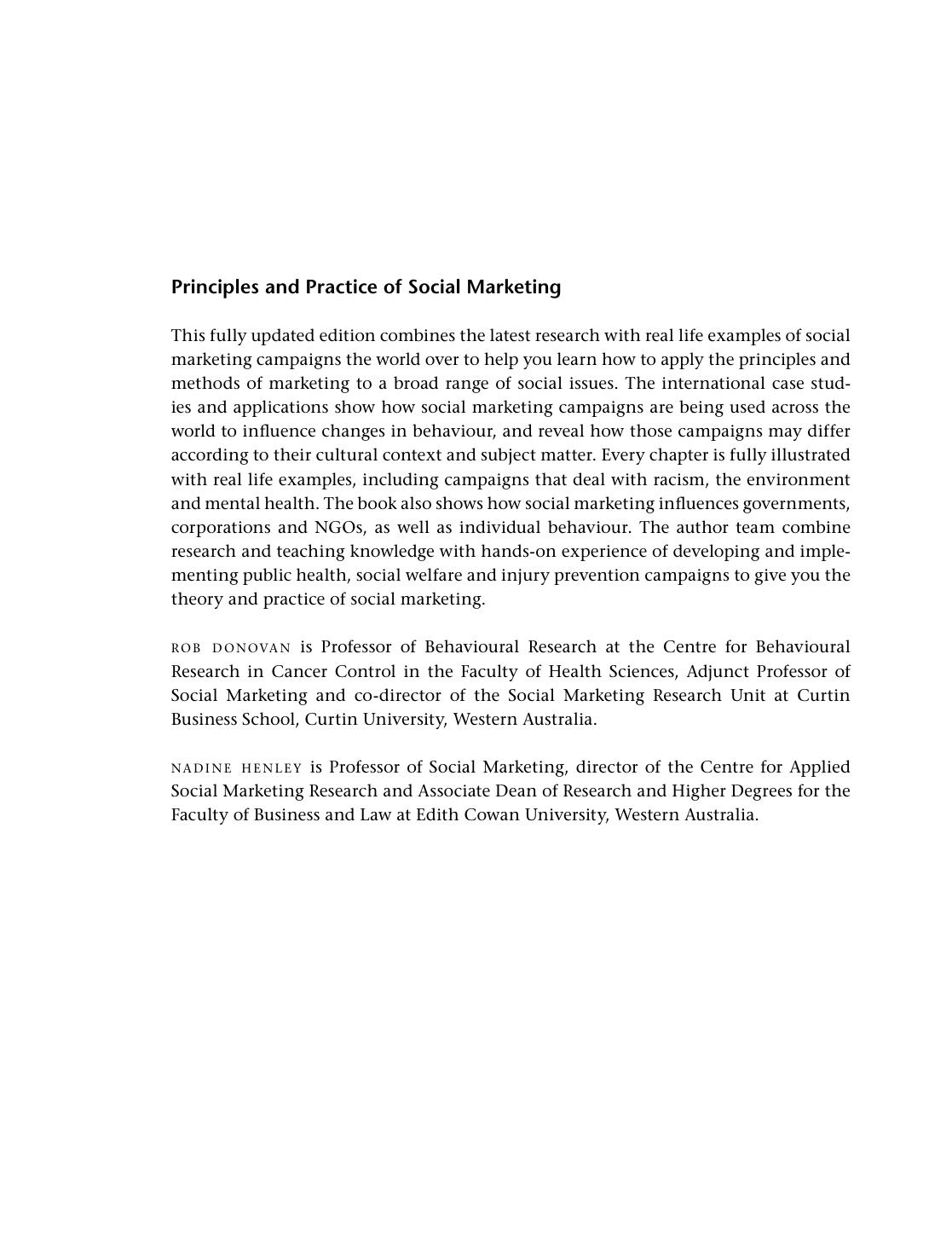Principles and Practice of Social Marketing An International Perspective 1st Edition by Rob Donovan, Nadine Henley ISBN 9780511851599 0511851596
$70.00 Original price was: $70.00.$35.00Current price is: $35.00.
Instant download Principles and practice of social marketing an international perspective after payment
Principles and Practice of Social Marketing An International Perspective 1st Edition by Rob Donovan, Nadine Henley – Ebook PDF Instant Download/Delivery: 9780511851599 ,0511851596
Full dowload Principles and Practice of Social Marketing An International Perspective 1st Edition after payment
Product details:
ISBN 10: 0511851596
ISBN 13: 9780511851599
Author: Rob Donovan, Nadine Henley
This fully updated edition combines the latest research with real-life examples of social marketing campaigns the world over to help you learn how to apply the principles and methods of marketing to a broad range of social issues. The international case studies and applications show how social marketing campaigns are being used across the world to influence changes in behaviour, and reveal how those campaigns may differ according to their cultural context and subject matter. Every chapter is fully illustrated with real-life examples, including campaigns that deal with racism, the environment and mental health. The book also shows how social marketing influences governments, corporations and NGOs, as well as individual behaviour. The author team combine research and teaching knowledge with hands-on experience of developing and implementing public health, social welfare and injury prevention campaigns to give you the theory and practice of social marketing.
Principles and Practice of Social Marketing An International Perspective 1st Edition Table of contents:
Chapter 1 Social marketing and social change
Marketing and business
What is marketing?
Defining social marketing
Social marketing’s beginnings
Social marketing and social change tools
Concluding comments
Questions
Further reading
Chapter 2 Principles of marketing
Marketing basics
Principles and practices of marketing
The use of market research
Differences between commercial and social marketing
Concluding comments
Questions
Further reading
Chapter 3 Social marketing and the environment
Environmental monitoring
Food for thought: a monitoring example
Environmental determinants of health and wellbeing
Social class and self-efficacy
Importance of early childhood
Social capital
Social ecology
Concluding comments
Questions
Further reading
Chapter 4 Advocacy and environmental change
Media advocacy: targeting socio-political change
Advocacy – a global phenomenon?
Advocacy for environmental change
Environmental cases from Central and Eastern Europe
Planning for advocacy
Concluding comments
Questions
Further reading
Chapter 5 Principles of communication and persuasion
Communication principles for successful campaigns
The communication process: Rossiter’s and Percy’s six-step model
Planning a communication strategy
Principles of exposure and attention
Cognitive processing models for persuasion: elaboration-likelihood model
Cialdini’s six principles of persuasion
Fear arousal and threat appeals
Incentive appeals
Framing effects
Concluding comments
Questions
Further reading
Chapter 6 Models of attitude and behaviour change
The health belief model
Protection motivation theory
Social learning theory
The theory of reasoned action
The theory of trying
Cognitive dissonance
Theory of interpersonal behaviour
The Rossiter–Percy motivational model
Morality and legitimacy
Diffusion theory
Behaviour modification and applied behavioural analysis
Synthesising the models
Concluding comments
Questions
Further reading
Chapter 7 Research and evaluation
Qualitative versus quantitative research
Qualitative research
Research and evaluation framework
Formative research: ‘what is likely to work best?’
Efficacy testing: ‘can it work and can it be improved?’
Process research: ‘is the campaign being delivered as proposed?’
Outcome research: ‘did it work?’
Do intentions predict behaviour?
Research concepts in public health
Research in ethnic and Indigenous communities
Most significant change technique: an alternative or additional methodology for community research
Concluding comments
Questions
Further reading
Chapter 8 Ethical issues in social marketing
What do we mean by ‘ethics’?
Ethical principles
Codes of behaviour
Criticisms of social marketing
Criticism of power imbalances in social marketing
Criticism of unintended consequences
Concluding comments
Questions
Further reading
Chapter 9 The competition
Competition and the principle of differential advantage
Defining the competition in social marketing
Monitoring the competition
Countering the competition
Kids are kids right? Wrong. Kids R Cu$tomer$!
Internal competition
Concluding comments
Questions
Further reading
Chapter 10 Segmentation and targeting
Psychographics
Motives and benefits segmentation
Sheth’s and Frazier’s attitude–behaviour segmentation
A stage approach to segmentation
Selecting target audiences
Cross-cultural targeting
Cultural tailoring
Individual tailoring
Concluding comments
Questions
Further reading
Chapter 11 The marketing mix
The social marketing mix
Policy
Product
Place
Price
Promotion
People
Partnerships
Concluding comments
Questions
Further reading
Chapter 12 Using media in social marketing
The importance of media in social marketing
Effectiveness of mass media in promoting health and socially desirable causes
A practical model for media use in social marketing programmes
Advertising
Publicity
Edutainment
Civic (or public) journalism
Word-of-mouth and viral marketing
New media
Choosing media and methods
Roles of the media in social marketing campaigns
Concluding comments
Questions
Further reading
Chapter 13 Using sponsorship to achieve changes in people, places and policies
The growth of sponsorship
Objectives of sponsorship
How sponsorship works
Evaluation of sponsorship
Measures of effectiveness
Health promotion foundations: the case of Healthway
Engaging the sponsored organisation
Evaluating health sponsorship: does it work?
Using sponsorship to achieve individual change
Using sponsorship to achieve structural change
Concluding comments
Questions
Further reading
Chapter 14 Planning and developing social marketing campaigns and programmes
Campaign versus programme
Overall programme planning models
Lawrence Green’s PRECEDE–PROCEED model
Concluding comments
Questions
Further reading
Chapter 15 Case study: the Act–Belong–Commit campaign promoting positive mental health
Background: mental illness and the need for mental health promotion
Background: origins of the campaign
Overall goals of the pilot campaign
Campaign goals
Overall strategy and planning
The marketing mix
Pilot campaign evaluation
The statewide campaign 2008–10
Why has the campaign been successful?
Concluding comments
Questions
Further reading
References
Index
People also search for Principles and Practice of Social Marketing An International Perspective 1st Edition:
principles and practice of social marketing an international perspective
what are the features of social marketing
what is social marketing theory
social marketing internship
social media global perspectives applications and benefits and dangers



